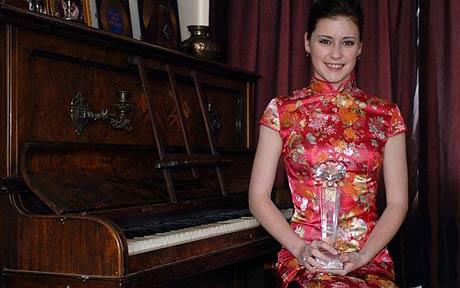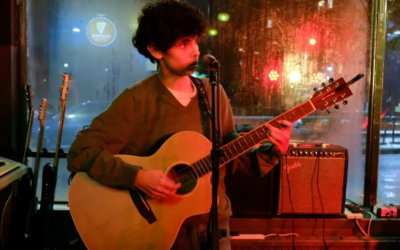One Direction, Leona Lewis and even Girls Aloud. Singing competitions within the UK have never failed to produce a plethora of talent over the years. But how about the Brits who have made a name for themselves competing abroad? Few musicians can boast such a varied, enthralling and internationally diverse career as Mary-Jess Leaverland, yet her unconventional ascent to fame symbolises how the secret to success may lie overseas.
From humble beginnings performing in pubs after school, to singing in front of an audience of 89,000 inside Wembley stadium, Mary-Jess attributes the catalyst for the meteoric rise to her victory on ‘Min Xing Chang Fan Tian’. Dubbed the ‘Chinese X Factor’ by the British press, the competition was the launchpad to the beginning of her success, hailing it for giving “the most incredible start to my career, so to imagine where I would be without doing it would be really hard.”
Living by the motto of “make the most of every single opportunity available to you”, a phrase her mother promoted and instilled, it was during her year abroad at University, living in China, where Mary-Jess struck singing gold.

“I ended up going to explore a TV studio and through a crack in a door I could see a Chinese man singing his heart out on stage. As soon as I saw that I knew what that was, it was an audition and quite possibly the biggest, most amazing opportunity I’ve ever seen.”
Two hours and one spontaneous audition later, she secured a spot on the show that would ultimately change her life and kick start her music path across the globe. But what ensued was an intense and challenging three week period, performing every night in front of an audience of 70 million on Chinese television. Nevertheless, the hard work and determination paid off, c\with the culmination of the experience being her victory.
“I had to turn to the other contestant and ask, did you win or did I? I’d been studying Chinese for a little while, but I thought maybe I’d misheard. After I’d realised, I felt a lot of excitement and relief, mainly because with the prize money I could afford a flight home to England for Christmas.”
Such is the influence of international competitions; they can offer the potential for instant success not just in the host country but also in the artist’s homeland. After her triumph in Asia, Mary-Jess experienced a whirlwind week of success upon returning to England. From landing on the front page of the guardian on Monday, to signing to her first record label on Wednesday and appearing on BBC Breakfast by Friday, she embraced every opportunity, maximising the impact global singing contests can have on a grassroot artist’s career.
Such impact was underscored by the fact the ‘Chinese X Factor’ didn’t even air outside its own country, yet she was still capable of achieving vast international success as a result. “It was all a bit bizarre, I’d gone and won this massive show to 70 million people in China, yet no one in England knew anything about it before my mum approached the press”. Regardless, her achievement still captivated the UK, instantly elevating her career to new heights.
What followed would see her career hit all the right notes. Singing at the FA Cup final, participating in the Great Festival of Creativity in Shanghai and even being invited to 10 Downing Street, Mary-Jess established herself as “the only soprano from UK who can deliver a full show in Mandarin Chinese” and achieved feats she had never imagined before her ascent to fame.
But beyond the bright lights, flashy record labels and immense crowds, international competitions also serve as a powerful platform for UK artists to build a globally diverse fan base. Unlike on British shows, winning or even just participating in these competitions allows artists to be exposed to fans from different cultures, and directly injects them into a new music industry, filled with new opportunities, as was the case for Mary-Jess.
For Jie Guo, watching Mary-Jess’ rendition of ‘Time to Say Goodbye’ live on the show’s finale, proved enough to gain his support: “I couldn’t help but feel amazed, there was something so special about her voice that I instantly became a fan. Since then she’s performed all over, but I’ve tried my best to follow her in every step.”
Singing competitions can also provide a transformative platform, benefiting not only young, grassroots artists, but also seasoned performers seeking a career boost later on. In an industry where younger artists arguably have an advantage in capturing the attention of labels and fans due to their perceived marketability and potential for long term success, these shows may offer older talent opportunities that may otherwise have been unattainable to them.
While Mary-Jess’ break through took place aged 19, she shares the belief that musicians should continue pursuing any artistic dream irrespective of their age, “It’s the most ridiculous thing that in the music industry it’s drilled into you, if you don’t make it by the time you’re 30 then you’ve failed. In classical music, voices don’t fully mature until mid 30’s, so this ageist idea is wiping out loads of artists before they’ve even reached full potential.”
“I hope independent artists of all genres will not limit themselves by an outdated belief, and continue to advance their careers by any means, whether that be through singing competitions or other methods.”
Admittedly grassroot artists competing in singing contests is no reinvention of the wheel. For decades UK singers and bands have tried their luck on shows like ‘The Voice’ and ‘The X Factor’ with varying levels of success, but few have ventured overseas to test their fortunes. The elusive career of Mary-Jess stands testament to the untapped potential that can be found competing beyond an artist’s home turf. It exposes them to a different market of fans and opens the door to international opportunities and collaborations.
“Whenever someone asks me what the best use of free time is I always suggest that you consider learning a language, so you can open yourself up to a whole other country full of opportunities. Whatever your aspirations may be, the more countries you can try and make them happen in, the better, but of course it’s always down to how much you push yourself in the first place.”
Follow us on Instagram, Twitter, Facebook and Tiktok for more content!









